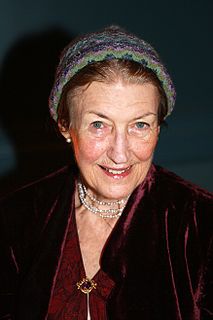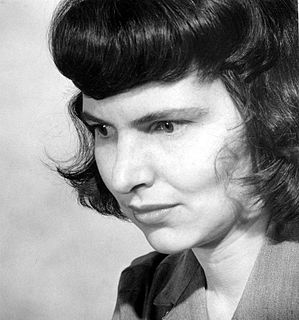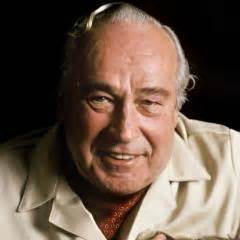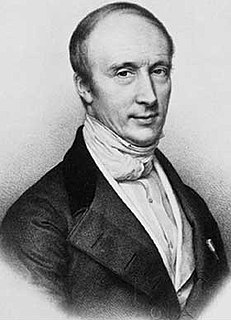Top 638 Articulate Quotes & Sayings - Page 11
Explore popular Articulate quotes.
Last updated on December 22, 2024.
Some things cannot be spoken or discovered until we have been stuck, incapacitated, or blown off course for a while. Plain sailing is pleasant, but you are not going to explore many unknown realms that way. We articulate the truth of a situation by carrying the whole experience in the voice and allowing the process to blossom of its own accord. Out of the cross-grain of experience appears a voice that not only sums up the process we have gone through, but allows the soul to recognize in its timbre, the color, texture, and complicated entanglements of being alive.
Again, it does seem like frustration is mounting in interesting ways, but I'm not sure there will be some dramatic tipping point. Then again, looking back on the history of television, you never know. People had to fight and articulate the politics and the rationale for different funding mechanisms. That was a long and drawn-out battle fought in different countries; it's not like BBC and the CBC in Canada just magically appeared out of the ether. People had to organize for it. I'm always willing to be surprised.
From the writer's point of view, critics should be ignored, although it's hard not to do what they suggest. I think it's unfortunate to have critics for friends. Suppose you write something that stinks, what are they going to say in a review? Say it stinks? So if they're honest, they do, and if you were friends you're still friends, but the knowledge of your lousy writing and their articulate admission of it will be always something between the two of you, like the knowledge between a man and his wife of some shady adultery.
On your principles, you should never yield; you should be prepared to be defeated. Nobody likes to be defeated, but you should let everybody know in the most articulate and thoughtful and civil way you can (you don't go out and pick fights with people) that in certain matters that you define as matters of principle you will not budge, you cannot yield, you will not compromise. If you don't have the votes or the winning argument, then you stand to be defeated and rolled over, and you'll just have to come back another day.
A writer writes a book. People read it. You don't know what they're reading, really. You read a review and think, "That is so inaccurate. You can't have been reading my book with any kind of attention, because that is all wrong, that's even the wrong name you're including there." But these reviewers have been diminished in importance, the work is so little respected. If you're reviewed by a real critic, by James Wood or Louis Menand, then you get something that is informed, interesting, and highly articulate. But the average review doesn't have that kind of depth anymore.
My stepfather, John O'Hara, was the goodest man there was. He was not a man of many words, but of carefully chosen ones. He was the one parent who didn't try to fix me. One night I sat on his lap in his chair by the wood stove, sobbing. He just held me quietly and then asked only, "What does it feel like?" It was the first time I was prompted to articulate it. I thought about it, then said, "I feel homesick." That still feels like the most accurate description - I felt homesick, but I was home.
How could I tell the doctor what was wrong with me? I didn't understand it myself. I couldn't articulate the pain; it was the pain of nothingness. My fear was of the weather, the atmosphere, the very air. What good did safety tips do me now? 'Avoid water, metal objects, rooftops; stay off the telephone in a storm, don't think glass can protect you; even if a storm was 8 miles away, you're still not safe from a strike. Avoid life perhaps that was the answer. The number one safety tip, stay away from it all.
In the art of teaching, we recognize that ideas and insights need to cook over a period of time.
Sometimes the student who is least articulate about expressing the ideas is in fact the one who is absorbing
and processing them most deeply. This applies as well to our own private learning of our art form; the
areas in which we feel most stuck and most incompetent may be our richest gold mine of developing
material. The use of silence in teaching then becomes very powerful.
I believe it to be of particular importance that the scientist have an articulate and adequate social philosophy, even more important than the average man should have a philosophy. For there are certain aspects of the relation between science and society that the scientist can appreciate better than anyone else, and if he does not insist on this significance no one else will, with the result that the relation of science to society will become warped, to the detriment of everybody.
Being a slow reader would normally be a deficiency; I found a way to make it an asset. I began to sound words and see all those qualities - in a way it made words more precious to me. Since so much of what happens in the world between human beings has to do with the inconsideration of language, with the imprecision of language, with language leaving our mouths unmediated, one thing which was sensuous and visceral led to, in the use of language, a moral gesture. It was about trying to use language to both exemplify and articulate what good is.
In the circle where I was raised, I knew of no one knowledgeable in the visual arts, no one who regularly attended musical performances, and only two adults other than my teachers who spoke without embarrassment of poetry and literature — both of these being women. As far as I can recall, I never heard a man refer to a good or a great book. I knew no one who had mastered, or even studied, another language from choice. And our articulate, conscious life proceeded without acknowledgement of the preceding civilisations which had produced it.
In fact, I always assumed that most everything I read was true, to one degree or another. I couldn't articulate this fact until after I read Tim O'Brien's The Things They Carried and he discussed Happening Truth, Story Truth, and Emotional Truth. I always understood that the facts of The Sun Also Rises or On the Road were the facts as dictated by a certain narrative structure, but because the experiences of those characters echoed my own feelings about the world. I knew there was a Happening Truth behind them.
I spend quite a bit of time thinking about my students. I look at them, at their work, I listen to what they tell me, and try to figure out who they might become in the best of all possible worlds. This is not easy. Students try to give you clues; sometimes they look at you as if imploring you to understand something about them that they don't yet have the means to articulate. How can one succeed at this? And how can one do it 20 times over for all the students in a class? It's impossible, of course. I know this, but I try anyway. It's tiring.
I know that I present very - they say that I present very, very calm and very, very smart, very articulate, elegant. Yeah. And I go, 'Brilliant teams of makeup and wardrobe happened to dress me and clothe me and put my face on and do my hair. And then these brilliant teams of writers give me words to speak. I just need to make sure that I have them all in this combination in my body, in my being, and then I get to do it on camera, in front of a brilliant team of camera workers who really know how to like me and make me sound good.' So I'm just really a dork in real life.
At birth we begin to discover that shapes, sounds, lights, and textures have meaning. Long before we learn to talk, sounds and images form the world we live in. All our lives, that world is more immediate than words and difficult to articulate. Photography, reflecting those images with uncanny accuracy, evokes their associations and our instant conviction. The art of the photographer lies in using those connotations, as a poet uses the connotations of words and a musician the tonal connotations of sounds.
I'm not just interested in the thoughts I have, but also in others' thoughts, and why not carry those forward? That's why American fiction can be so thin. All these fears, like not seeming to be original - I mean, hell, most stuff isn't. The question is whether you can articulate your thoughts for the moment in which you're living, which is a different time. Say them in a newer way. There are new events, and language changes - sensibilities change. We are writing in and of the time we're in. Oh, it's a weird time.
FAQ regarding my book were not about my use of commas or how the images went berserk, but about the political situation in Bosnia, about guilt and shame, about victims and perpetrators, about reasons, arguments and beliefs that led to the conflict in the first place, etc. All of this needed and still needs answering and ongoing discussions, but I mostly felt overwhelmed and unqualified to articulate anything worth more than personal experiences of the siege, of fear and refuge - all the things which I wrote about anyway.
Certainly for me prose has a dilatory capacity, insofar as I don't trust my abilities in prose. I imagine I could have done the same thing in poetry, but sometimes I feel more fluent in poetry than in prose, and as a consequence perhaps I might pass too quickly by a thing that I might, in prose, have struggled merely to articulate. That struggle creates space, and it seems to me a particular kind of space into which memory flows easily. I suspect I think better in poetry, however.
Your Majesty, please get down. My friend Aris is really a very good man, and if you fall off that wall he's going to hang for it, and so will his squad, most of whom are also nice men, and though I can't say I really care if your attendants hang, there are probably many people that do care, and would you please, please get down?" The king looked at him, eyes narrowed. "I don't think I've ever heard you say that many words in a row. You sounded almost articulate.
She was trying to say something else; she was trying to say that the inability to articulate what one feels in any satisfactory way is one of our enduring tragedies. It wouldn't have been much, and it wouldn't have been useful, but it would have been something that reflected the gravity and the sadness inside her. Instead, she had snapped at him for being a loser. It was as if she were trying to find a handhold on the boulder of her feelings, and had merely ended up with grit under her nails.
That is a horrible thing in a way, but it is the one thing poets can bring back to experience, this intense focus on language, which activates words as a portal back into experience. It's a mysterious process that's very hard to articulate, because it's focused entirely on the material of language in a way, but in the interests not just of language itself whatever that would mean - that's the mistake, by the way, that so many so-called "experimental" poets make - but in service to human experience.
With the aurora borealis flaming coldly overhead, or the stars leaping in the frost dance, and the land numb and frozen under its pall of snow, this song of the huskies might have been the defiance of life, only it was pitched in minor key, with long-drawn wailings and half-sobs, and was more the pleading of life, the articulate travail of existence. It was an old song, old as the breed itself--one of the first songs of the younger world in a day when songs were sad.
President Trump watches a lot of television. I mean, really a lot. His favourite channel is Fox. Now just imagine somebody wants put a message in front of the president. You can hire a lobbyist or you can buy a minute on Fox or you can even pay somebody at a think tank to articulate your message and then pay a booker at that think tank to get that person on Fox and put the thought directly in the president's ear.
The poet or the revolutionary is there to articulate the necessity, but until the people themselves apprehend it, nothing can happen ... Perhaps it can't be done without the poet, but it certainly can't be done without the people. The poet and the people get on generally very badly, and yet they need each other. The poet knows it sooner than the people do. The people usually know it after the poet is dead; but that's all right. The point is to get your work done, and your work is to change the world.
Like Summer Sisters comforted me just because I was like, okay things I've seen with my own eyes are not so terrible, and even though I knew adult gay people and had absolutely no issue with it. And I just couldn't articulate what made me so uncomfortable about the space that I shared with my friends becoming a sexual space. And it was very healing for me to read that, and feel like it was a part of other friendships, even fictional friendships I admire.
As you know, shibumi has to do with great refinement underlying commonplace appearances. It is a statement so correct that it does not have to be bold, so poignant it does not have to be pretty, so true it does not have to be real. Shibumi is understanding, rather than knowledge. Eloquent silence. In demeanor, it is modesty without pudency. In art, where the spirit of shibumi takes the form of sabi, it is elegant simplicity, articulate brevity. In philosophy, where shibumi emerges as wabi, it is spiritual tranquility that is not passive; it is being without the angst of becoming.
The Nazis, for him, are merely available movie tropes--articulate monsters with a talent for sadism. By making the Americans cruel, too, he escapes the customary division of good and evil along national lines, but he escapes any sense of moral accountability as well. In a Tarantino war, everyone commits atrocities. Like all the director's work after 'Jackie Brown,' the movie is pure sensation. It's disconnected from feeling, and an eerie blankness--it's too shallow to be called nihilism--undermines even the best scenes.
The fact that I am constantly immersed in the act of legal writing and editing has made me a better and more efficient creative writer and editor. In the end, lawyers need to tell compelling stories when they write a brief or other legal argument. A successful lawyer understands that the judge is merely a person who is going to read that brief, which should articulate a compelling reason for the judge to rule in that lawyer's favor. In other words, a legal advocate needs to get the judge to care. That's not dissimilar to what a creative writer does.
Writers on the subject of August Strindberg have hitherto omitted to mention that he could not write. ... Strindberg, who was neither a good nor a wise man, had a stroke of luck. He went mad. He lost the power of inhibition. Everything down to the pettiest suspicion that the dog had been given the leanest mutton chop, poured out of his lips. Men of his weakness and sensuality are usually, from their sheer brutishness, unable to express themselves. But Strindberg was mad and articulate. That is what makes him immortal.
In my opinion, you have to have a vision for how you add value to others through your product or service. Why do you exist? All of us need a reason to get out of bed in the morning and enthusiastically approach each day. Some people say money is their purpose - - my reaction is that, if money is your purpose, you risk running out steam well before you make a lot of money. Money is an outcome that comes as a result of adding value for a sustained period of time. I encourage people and companies to search for and articulate the vision for why they are doing what they're doing.
Some people's joints articulate in a manner that allows them to benefit greatly from squats; others may not benefit at all. If you're not too tall and have short limbs, it may be the best exercise for you, but if you're tall with long legs, it might be both ineffective and dangerous.I was stubbornly faithful to squats for years until I finally realized they were not well-suited for my body structure. After I switched tomore muscle-intensive movements, my gains in leg size were astounding.
Everybody remembers numbers and computers remember numbers. People remember procedures and computers certainly remember procedures. But the other thing that's still important is that your perception as a human is affected subtly by all this stuff that you can't quite articulate. You run your life according to all this stuff that's happened to you. All of your memories affect everything you do whereas with a computer, there's adaptive software and things, but it's more literal.
I think people do look to writers to tell the truth in a way that nobody else quite will, not politicians or ministers or sociologists. A writer's job, is to, by way of fiction, somehow describe the way we live. And to me, this seems an important task, very worth doing, and I think also, to the reading public, it seems, even though they might not articulate it, it seems to them something worth doing also.
First, it is necessary to study the facts, to multiply the number of observations, and then later to search for formulas that connect them so as thus to discern the particular laws governing a certain class of phenomena. In general, it is not until after these particular laws have been established that one can expect to discover and articulate the more general laws that complete theories by bringing a multitude of apparently very diverse phenomena together under a single governing principle.
We feel an affinity with a certain thinker because we agree with him; or because he shows us what we were already thinking; or because he shows us in a more articulate form what we were already thinking; or because he shows us what we were on the point of thinking; or what we would sooner or later have thought; or what we would have thought much later if we hadn’t read it now; or what we would have been likely to think but never would have thought if we hadn’t read it now; or what we would have liked to think but never would have thought if we hadn’t read it now.
Cavendish was a great Man with extraordinary singularities-His voice was squeaking his manner nervous He was afraid of strangers & seemed when embarrassed to articulate with difficulty-He wore the costume of our grandfathers. Was enormously rich but made no use of his wealth... He Cavendish lived latterly the life of a solitary, came to the Club dinner & to the Royal Society: but received nobody at his home. He was acute sagacious & profound & I think the most accomplished British Philosopher of his time.
I wasn't able to articulate it until after audience members gave feedback. And then, similarly, when we talked about the bromance being unique, I don't think Mark, Jay, and I really saw how special that aspect of that bromance was until our audience members sort of gave us feedback and let us know, "Hey, we've never seen a bromance like this before on television."
I don't particularly care about having [my characters] talk realistically, that doesn't mean very much to me. Actually, a lot of people speak more articulately than some critics think, but before the 20th century it really didn't occur to many writers that their language had to be the language of everyday speech. When Wordsworth first considered that in poetry, it was considered very much of a shocker. And although I'm delighted to have things in ordinary speech, it's not what I'm trying to perform myself at all: I want my characters to get their ideas across, and I want them to be articulate.





































